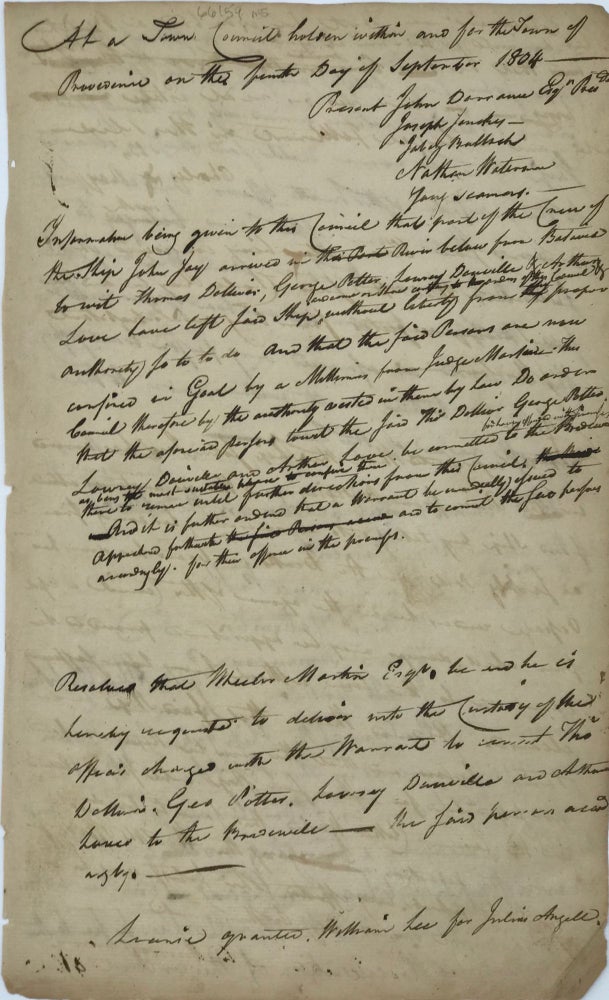
RESOLUTIONS REGARDING THE MEMBERS OF THE CREW OF THE SHIP JOHN JAY, LATELY ARRIVED AT PROVIDENCE, RHODE ISLAND FROM BATAVIA, SEPT. 1804.
Manuscript document, in at least two different hands, with additions and corrections. Single sheet, 32 x 19 cm., 2 pp., approx. 400 words. At a town council meeting held on Sept. 4, 1804, John Dorrance, Joseph Jenckes, Jabez Bulloch [sp?], Nathan Waterman, and [?] Simmons, were informed that "part of the crew of the ship John Jay arrived in the river below from Batavia, to wit Thomas Dolliver, George Potter, Lovsey Danville, and Arthur Love" had left the ship without permission from the health officer and were confined to jail on orders of Judge Martin. The council members confirm the Judge's order and direct the men to be confined to the Bridewell until further notice. The verso of the document includes an order that "Capt. John Fry, master of the ship John Jay lately arrived in this port from Batavia return immediately on Board said ship there to remain until said ship is cleared to the satisfaction of the health officer and it is further ordered that none of the crew belonging to said ship leave the same...." Likewise, no one from shore was to be allowed on board the ship. Another order issued at a town council meeting on the same day permitted the crew to come ashore "leaving behind their bedding & bringing nothing but their wearing apparel on their bodies from on board." Item #66159
This document reflects the regulations the council had put in place governing the quarantining of ships and sailors arriving from foreign ports. The health officer was to be the first person on board, charged with examining the returning sailors and ordering the disposal of their clothing, bedding, and other effects to protect local inhabitants from infectious diseases like yellow fever.
An article by Dr. E.M. Snow in the Providence Journal of June 1857 discusses the history of yellow fever epidemics in the city: "In the summer of the year 1800 the yellow fever seemed to be confidently expected in Providence, and an order was issued by the Town Council respecting the removal of nuisances on the 12th of May. As early as the 22d of June a vessel arrived from Jamaica with cases of yellow fever on board, which were sent to the hospital. Other infected vessels arrive in June and July, but no case occurred among the inhabitants until the 15th of August. The first case was a Mrs. Taylor, who lived on the west side of Wickenden street, a little north of the present location of the Providence Tool Company. She died on the 20th of August."
The merchant ship John Jay was returning from a trip to the Dutch East Indies for the mercantile firm of Brown & Ives of Providence, Rhode Island. Built in 1794, the ship regularly transported cargo back and forth between Providence, Batavia [Jakarta], and Canton. On her voyage out from Providence in November 1803, her "outward cargo was $60,000 in specie, and about $300 in bar iron, gin, flour, and cheese. She arrived out March 29, 1804, sailed in April, and arrived in Providence in September. She entered the custom-house without unloading, and sailed for Amsterdam on September 23...." Offloading her cargo there, she immediately sailed back to Batavia, took on a new cargo of coffee, sugar and tin, and began the return voyage to Providence.
In January 1806, on that return voyage, the John Jay was captured by the British naval ship HMS Driver and escorted to Bermuda where both the ship and cargo were taken as prizes. Brown & Ives immediately dispatched an agent to protest the action and declare the neutrality of the ship and its cargo. Mr. Ives' notes include his concerns: "Evidence must be obtained to show that American vessels were permitted in time of peace to enter from Batavia as from Amsterdam." A settlement ultimately resulted in the ship being cleared to return from Bermuda to Providence in June 1806. The John Jay's next voyage was her last. She wrecked in the Java Sea in 1808, "leaving her bones on some ledges and sands near the port of Batavia." [see the article "Early Oriental Commerce in Providence" in the Proceedings of the Massachusetts Historical Society, Third Series, vol. 1 (1907-08), pp. 236-278.
Price: $275.00
